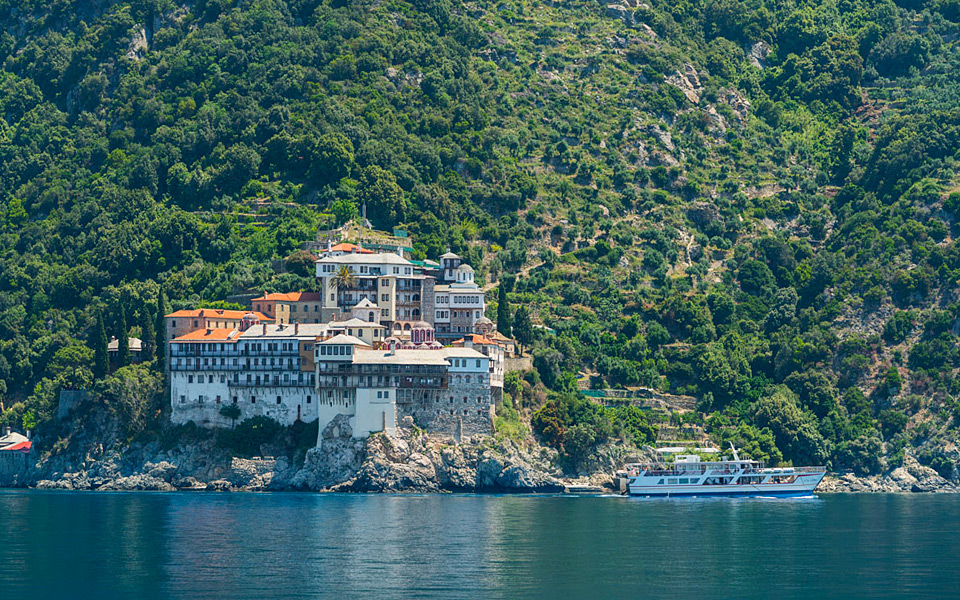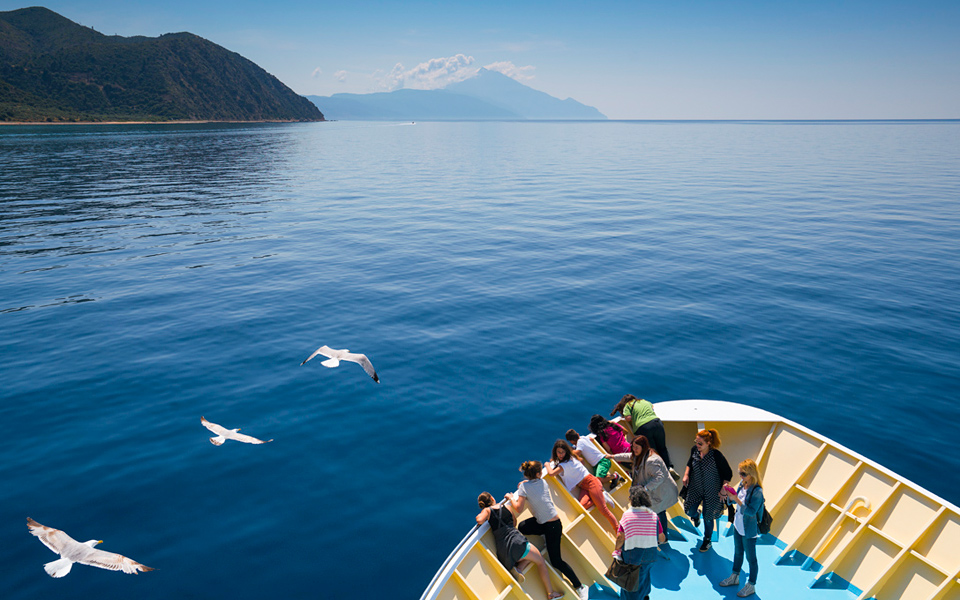The idea of the cruise was already making me a little nervous and I didn’t quite know what to expect. The initial signs were strange. At some café in Ouranoupoli, a clutch of elderly women from Athens were chattering as they paced back and forth, worried they might miss the boat that was due to leave shortly.
Watching them, I had the feeling that most of those who want to get a look at Mt Athos from the sea are religious women of a particular age. As our boat began to fill up, I realized that I was wrong. To my surprise, my fellow passengers included young and middle-aged couples, families and groups of friends, both Greek and foreign (which is why the tour is conducted in Greek, English, German, Russian, Romanian and even more languages, depending on where the passengers come from).
Accompanied by dozens of white seagulls following us like manic angels, snatching at the bread and cookies we threw to them, we set off a little after 10:30 for the west coast of Mt Athos. (The rules are that we cannot come within 500 meters). The voice over the loudspeaker informed us of restrictions forbidding women from setting foot in the monastic state. Why no women? Tradition says that on her way to Cyprus, the Virgin Mary came across this peninsula, and was so taken by the place that she prayed to Jesus that she should be given it as her own, to the exclusion of all other women.
“When I gazed at Simonopetra, I got the sense that it encapsulates the whole meaning of the place: remote, isolated, a little the worse for wear, with more humility”

© Perikles Merakos
As we left the harbor behind, I looked at the schedule for the trip. We would pass by eight monasteries: Docheiariou, Xenophontos, Aghios Panteleimonas, Xiropotamos, Simonopetra, Osios Grigorios, Dionysios and Aghios Pavlos. In the middle, between the Xiropotamos and Simonopetra, is Dafni, the main harbor of Mt Athos.
We had two of the best seats on the boat – at the rear left, directly opposite the peninsula. As we neared the first monastery, our guide began to tell us about life on the religious mountain, about the arsanaris (person responsible for the monastery harbor) and the archontaris (person responsible for visitor hospitality). For the most part, the passengers sat quietly, although with cameras at the ready. It was a sunny day. At times, the woman sitting in front of us opened her umbrella to shield herself from the sun.
As we approached the first monastery, everybody crowded around us to get a better view. It was truly amazing to see the monasteries from such a close distance. They are each so different: Some are larger than others, some more resplendent, while a few really bear the marks of time. I think the most beautiful are the monastery of Aghiou Panteleimonos, also called the Russian monastery – it’s huge, masculine and aggressively handsome, dominating its surroundings – and the monastery of Simonopetra, founded as New Bethlehem by a 13th-century monk called Simon. Built on a rock, it now houses about 60 monks. Without knowing much about Mt Athos, when I gazed at Simonopetra, I got the sense that it encapsulates the whole meaning of the place: remote, isolated, a little the worse for wear, with more humility than one might expect given its incredible beauty. That is the image I kept from my trip. That, and the crazy gulls and the dolphins that greeted us enthusiastically by poking their heads out of the water.
INFO
Athos Sea Cruises organizes boat rides along the coast of Mt Athos from April to the end of October
• Boats leave from the Ouranoupoli harbor (10:30 and 13:45)
• The cruise takes approximately 3 hours and costs about €20












